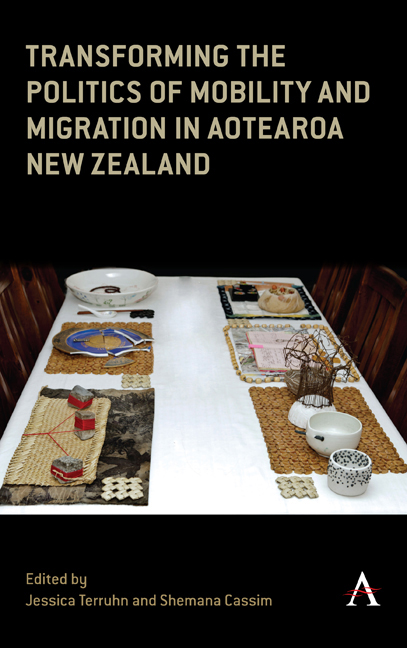Book contents
- Frontmatter
- Contents
- Acknowledgements
- Contributors
- Glossary of Te Reo Māori Words
- Glossary of Te Reo Māori Place Names
- Glossary of Other Non-English Words
- List of Tables
- List of Figures
- Introduction: Reimagining the Politics of Mobility and Migration Through Decolonisation, Social Justice and Solidarities
- Cover Artwork: A Place at the Kauri Table Revisited … 2021
- Part One Decolonising the Politics of Migration
- Part Two Humanising the Politics of Transnational Mobility
- Part Three Building Solidarities for Migrant Rights and Belonging
- Conclusion: Towards Transforming the Politics of Mobility and Migration in Aotearoa New Zealand
- Index
Seven - Off the Team: Solidarities and Exclusions in Pandemic Aotearoa New Zealand
Published online by Cambridge University Press: 28 February 2024
- Frontmatter
- Contents
- Acknowledgements
- Contributors
- Glossary of Te Reo Māori Words
- Glossary of Te Reo Māori Place Names
- Glossary of Other Non-English Words
- List of Tables
- List of Figures
- Introduction: Reimagining the Politics of Mobility and Migration Through Decolonisation, Social Justice and Solidarities
- Cover Artwork: A Place at the Kauri Table Revisited … 2021
- Part One Decolonising the Politics of Migration
- Part Two Humanising the Politics of Transnational Mobility
- Part Three Building Solidarities for Migrant Rights and Belonging
- Conclusion: Towards Transforming the Politics of Mobility and Migration in Aotearoa New Zealand
- Index
Summary
Diasporic Strategies – From Hostility to Solidarity (and Back Again?)
Many countries re-evaluated their relationship with diasporic communities around the turn of the twenty-first century, with Larner (2007) and Gamlen (2013), among others, noting the early 2000s as an inflection point in diaspora strategy for Aotearoa New Zealand (hereafter, Aotearoa). Gamlen (2013) cites high-profile mainstream media and political comments that expressed hostility to permanent residents and citizens who live outside Aotearoa – including stereotypes that those who emigrate are selfish or disloyal, that they have abandoned their ‘natural’ solidarity with family and nation and that they have betrayed their compatriots in search of economic gain. Beginning in the early 2000s, however, political sentiment and public policy began explicitly to recognise the value of Aotearoa's diaspora, both economically and culturally, as well as the many benefits of internationally connected residents within the country (Gamlen 2013).
The earlier negative attitudes towards the diaspora are striking and in need of some explanation. Lorenzo Veracini's (2010) work on settler colonialism suggests one potential line of analysis. He argues that in settler colonial societies like Aotearoa, there exists
a special type of sovereign entitlement that is claimed by a specific class of settlers: those who have come to stay, those who will not return ‘home’. It is an animus manendi that distinguishes the settler from the other colonists – as the very word ‘settler’ implies, it is the intention to stay (as opposed to the sojourners’ intention to return) that contributes the crucial differentiating trait. (Veracini 2010, 53; see also Belich 2005)
A plausible chain of associations may run from the self-understanding of the settler as someone whose legitimacy is derived from their intention to ‘stay’. From this perspective, those who leave are violating a sort of compact, undermining the claims to legitimacy of those who want to stay, and leading to perceptions of betrayal and associated negative stereotypes that cast aspersions on the loyalties and solidarities of those in the diaspora.
In this context, the turn of the century rise in international mobility (de Haas, Castles, and Miller 2020, 4; Scholte 2005, 104–105) created incentives to positively re-evaluate Aotearoa's large diaspora, as well as internationally connected residents within Aotearoa's borders. As Gamlen suggests, governments increasingly oriented to an interconnected global market began to perceive the value of the international knowledge and connections their diasporic communities could bring (Gamlen 2013).
- Type
- Chapter
- Information
- Publisher: Anthem PressPrint publication year: 2023

